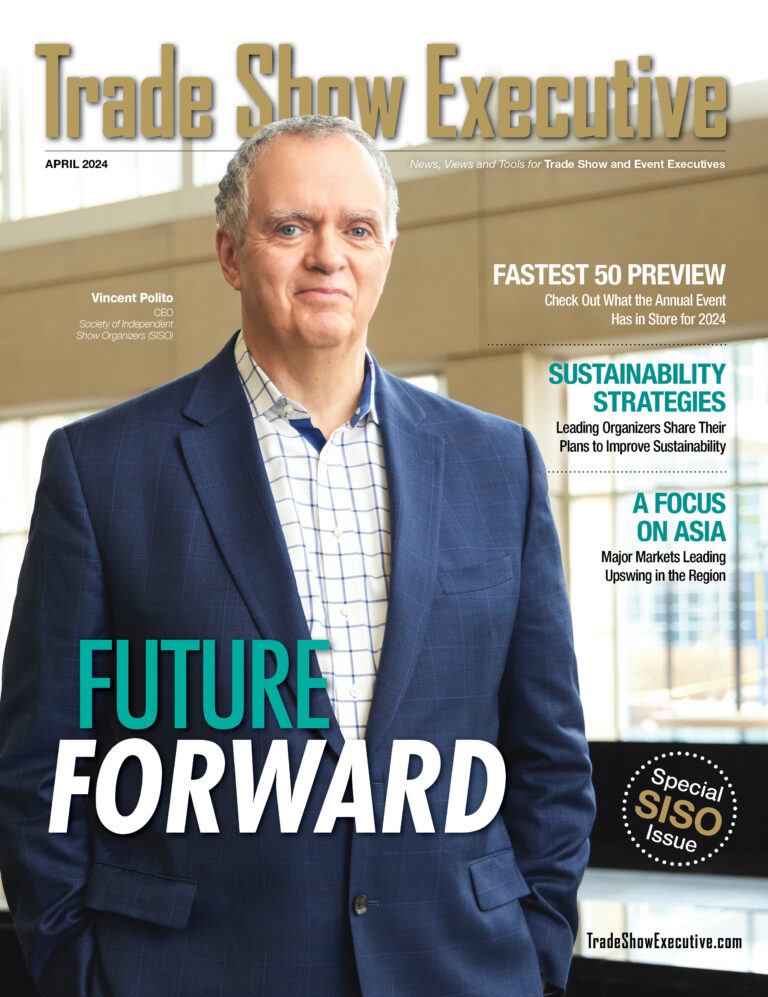Gary Shapiro, president and CEO of the Consumer Electronics Association and the driving force behind International CES, has just published The Comeback: How Innovation Will Rescue the American Dream. The 225-page book — a New York Times bestseller — will help you sort out the smart from the stupid in the national debate on issues impacting our daily lives. In an interview with guest contributor Bob James, Gary offers his thoughts on America’s future and the connections between trade shows and innovation.
Bob: You write in The Comeback that “America is faltering.” Isn’t that alarmist?
Gary: The trend lines are clear. We’re soon going to be paying interest of a trillion dollars a year on debt, unless the government does something radically different. Government will not be able to provide basic services, whether it’s defense or investment in education and infrastructure. So, we’re on a trend line that will seriously weaken our economy.
Bob: From what I’ve read, the interest payments are going to cost every American about $2,500 a year.
Gary: That sounds right. It means we are facing some serious issues. Right now, interest rates are exceptionally low and the dollar is strong. But those factors will change, and if debt continues to increase, which is the present course, we are going to be seriously hurt as a country. And we can’t get out of paying interest. Unless we default, everything else has to be cut.
Bob: You could buy a lot of consumer electronics for $2,500.
Gary: Well, that’s the point, and that’s why my industry’s leadership is concerned. Every industry should be concerned, including the exhibition industry. You can’t have a healthy economy when all you’re doing is paying down debt. It’s the kind of trap in which Third World countries now find themselves. When you’ve borrowed a lot, how do you grow as an economy when all your cash flow goes to paying off debt?
Bob: A lot of people claim America is “exceptional,” but can’t say why. You can and do. Explain your viewpoint.
Gary: We’re the most heterogeneous, diverse country in the world. Our genetic pool comes from those who came here for a better life. And they came here to pursue the American Dream of working hard and doing something better for their kids. As President Obama noted in his State of the Union Address, “American kids are not learning via rote memory: they’re taught to ask questions.” We always push back and think we can do it better, and that is the culture here. Another part of our culture is our entrepreneurial way, and another is our legal structure. Our Constitution ensures that if you to come up with a new idea, you’ll be protected from the government knocking it down. Also businesses grow out of experience here. Business failure is valuable experience rather than a dishonor. Nowhere else in the world do kids have lemonade stands? We are blessed with a different culture and it’s a culture of always pushing back against the status quo, as opposed to accepting it.
Bob: How can the political parties come together?
Gary: Both parties have retreated to opposite corners, and you have to buy into the party platform or you can’t be part of the party. Because of this perversity, many of the American public, for the first time, actually considers themselves independents. If you don’t buy into the far right social and economic agenda, and support the wars and oppose same-sex marriage, you can’t be Republican. And you can’t be a Democrat if you have different views on social issues, or if you have economic views that are a little more conservative and you want to see a balanced budget and spending cuts. There’s really no room in the middle of those two extremes, and the parties are increasingly demanding loyalty. The charter with the American voter is failing. It’s all silver bullet solutions. Republicans promise they’ll solve the budget problem, promise they’ll reduce fraud and abuse. Democrats say either the budget is not really a big problem or, if we just tax wealthy people, we can solve it. What I would prefer is to see people on all sides agree on what the facts are, and I think the facts about the deficit are pretty clear. The American voter has to really push the decision-makers and say, “If you’re going to cut, where is it going to come from?” And we have to have some tough discussions. We’re starting to go in that direction, starting to hint about Social Security, Medicare and Medicaid. We’re starting to ask questions about why we have troops in Europe and Korea, and there are also questions about Afghanistan and Iraq. The whole point of the book is that we can’t do everything, we have to choose.
Bob: You’re pretty hard on unionized government employees. Why is that?
Gary: The Wall Street Journal, which reviewed my book, ran stories about what happened in Wisconsin. Basically, a lot of school days were cancelled because the teachers called in sick so they could protest the government’s proposed “modest” changes, which would require teachers to contribute to their pensions and would limit their collective bargaining rights for health care, but not for salaries and compensation. Most union workers are government employees. In states like Wisconsin, until the change in the law, every government worker has to pay huge dues to the union. Will changing these laws push more Americans towards poverty? No. In fact, it will allow government to do what we do in industry – pay differentially based on performance and become efficient and move on those not suited for their jobs. Unions are incompatible with innovation. Innovative companies aren’t unionized, especially in the tech world. So, I do not believe unions at this point contribute positively to society. The things they fought for during the last hundred years are all law now, whether it’s overtime or safe working conditions, and workers are protected. Look at Virginia. It has established itself as a right-to-work state. As a strategy for the state, it has attracted a lot of business, created a lot of jobs. Virginia has one of the lowest unemployment rates in the country, yet it is decidedly considered to be anti-union. So I think when laws do not encourage unions, the players are more likely to create jobs. And if you think about it, why has Detroit lost so many jobs while the southern states have an incredible number of car manufacturers? The answer is not the skill level. It’s the fact that those states are not pro-union and they’re not unionized facilities. They’re creating jobs there — so not having unions actually increases jobs. And they’re not poor jobs; I don’t think anyone working in American Toyota or BMW plants views themselves as having a bad job.
Bob: But don’t union jobs set the bar for all workers’ wages?
Gary: I think the discussion can be split into government and non-government unions. I am most familiar with the non-government unions involved with trade shows. They are important, skilled and add value. Cities often succeed as major event venues based on the skill and reasonableness of their unions. It’s a competitive world, not only among cities and trade shows but in the marketplace of products. The same people who are pro-union are benefitting from shopping at Wal-Mart and buying low-priced products likely made by non-union workers. Average Americans benefit from trade and from having the choice between union- or non-union-made products. People can buy coffee which is considered fair trade, but they have a choice of what to buy. Now for the government workers, it’s a totally different situation. With government, workers have to be in the country to perform the service. In The Comeback, I decry how government union workers have hurt taxpayers. As budgets tighten, older workers with unions stay no matter how good they are and the younger and often better workers are fired. Older government workers are literally benefitting at the expense of children being educated. So we’re stealing from kids. Society has lost its balance in terms of what’s important. The private-worker problem has been dealt with by the free market. Companies abandoned Detroit because of the unions, there’s no question. Companies either moved abroad or moved to environments that are not pro-union. Why? Unions operate in the short term. They don’t operate in the long term, in terms of the interests of the businesses or governments that they’re dealing with.
Bob: What prompted you to write The Comeback?
Gary: I wrote it because I have a three-year-old son and am concerned about his future. I absolutely believe every American has an obligation to fix things that are really wrong with the country. And I believe innovation is the key to our future.
Bob: How is innovation related to trade shows?
Gary: There’s a fact the trade show world in the U.S. can’t ignore. The U.S. has become a slower-growth economy compared to Asia and other parts of the world. And that’s a fact going forward. Now, trade shows wouldn’t exist if there weren’t new things to show. You can’t run a trade show and offer the same things year after year — the same companies and the same products. There has to be innovation; trade shows cannot exist without innovation. An international show like ours, which strives to be the center of an industry, was easier to run when the U.S. had the strongest economy in the world. But a slower-growth, less-strong economy makes it more difficult to stay on top. If there’s faster growth elsewhere, our show’s importance is threatened. If innovation slows down as a result of our immigration policy, if we make it difficult for people to attend shows, if we close our borders, it hurts trade shows. Why is it that the major international events in most categories are outside the U.S.? In the U.S., we have the best convention centers, the best hotels, the best skilled labor force putting on shows, and we even benefit from a weaker dollar. We don’t have the biggest international shows because that is not part of our national export strategy. Our government makes it difficult. They are rude to our international guests. We impose unreasonable restrictions on travel. We have isolated ourselves and not entered a trade deal in over four years while the rest of the world is cutting barriers we leave them up. Our government rarely considers itself as an international host – our inhospitality compares unfavorably to any other developed country where the national leaders engage for major events. Our culture is pro-innovation, but I don’t think our government is focused on exports and innovation as a national strategy.
Bob: What can organizers do?
Gary: What I think show organizers should be doing is focusing on helping the U.S. economy, exports and innovation. They should be engaged in Washington. They should recognize that innovation is a good national strategy and that all of nature, everything in life, is about change and that their shows are going to change over time. We have started a movement around innovation as a positive force and strategy. The Innovation Movement has attracted over 100,000 Americans committed to pro-innovation policies. Show organizers and their teams and customers can and should join at www.innovation-movement.org
Ten years ago, everyone said the Internet was going to replace shows. That’s clearly not the case. Shows are doing well. But continued success is not guaranteed and there are a lot of risk factors out there. The biggest one, without question, is the health of the U.S. economy.
Bob: Some people feel that the next logical step in your career is holding public office. Would you ever consider running for President of the U.S. or any other political position?
Gary: I have a great job with a great industry and leadership that is committed to the future of our nation. It is rewarding and it is full-time. I am hoping to see American politicians address the most critical issues we face as a nation but I am concerned that the two political parties have little room for solutions which involve shared sacrifice. I will support candidates who articulate a vision for our future that confronts the reality of our problems with a plan that involves a focus on growth and shared sacrifice.
Bob James is president of The Mighty Copywriter, a Washington, DC firm that specializes in writing for associations and for-profit organizations. Reach Bob at (202) 537-1169 or bob@themightycopywriter.com











